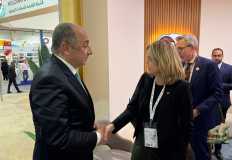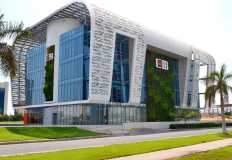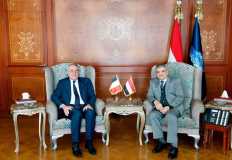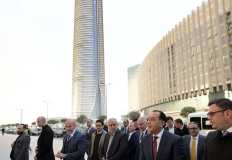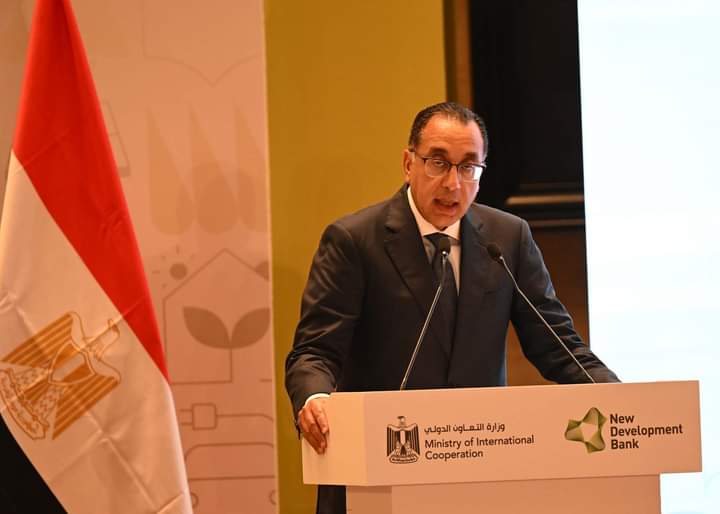
Prime Minister Dr. Mustafa Madbouly participated, Tuesday, in the opening session of the first international conference of the New Development Bank in Egypt, held under the patronage of President Abdel Fattah El Sisi for two days in the New Administrative Capital. It carries the slogan: "Exploring New Horizons".
The event welcomed a high-level delegation from the bank, led
by Dilma Rousseff, President of the New Development Bank. Ministers,
ambassadors, parliamentarians, presidents, and representatives from
international and regional organizations, development partners, economists, the
business community, private sector, and international and regional research
centers all attended.
At the beginning of the opening session, Dr. Madbouly conveyed
to the attendees President Sisi's greetings. He wishes that that important
gathering be fruitful and constructive in serving all member states of the
BRICS and the New Development Bank.
The Prime Minister hailed the New Development Bank's decision
to select the Arab Republic of Egypt as the first member state to host this
inaugural high-level meeting. The gathering will review the bank's diverse
range of development activities, including providing accessible financing
options, facilitating local currency transactions between member states, and
introducing mechanisms to support the private sector. These mechanisms encompass equity
participation, easy financing solutions, and technical assistance for small and
medium-sized enterprises.
Dr. Mostafa Madbouly considered that holding this forum presents
a valuable opportunity to highlight Egypt's key development initiatives. We can
showcase progress in community development, poverty reduction, infrastructure
construction, and government support for the private sector. I look forward to
a productive dialogue on the crucial role of South-South economic partnerships,
particularly the "BRICS+" group, in achieving national development
goals. Let's explore strategies that benefit all parties and maximize the
impact of investments in sustainable development.
The Prime Minister affirmed that this forum comes at a very
critical stage. Dangerous regional and global developments threaten the
economies of major powers and developing nations. This underscores the critical
role of the New Development Bank. In
light of the decline in ways to obtain easy financing, credit ratings falling, as a result of the increase in risks, and the
failure of the current international system with its old mechanisms to face
these challenges, the NDB must support member states' development plans.
Madbouly acknowledged the international challenges and the
need for reform within the global financial system. He expressed confidence
that, through collaboration between member states and the New Development Bank,
these crises can be overcome and a more equitable international system
achieved.. He expressed his hope for the bank's future plans to promote local currency
transactions, utilize innovative financial mechanisms, and provide technical
support to both public and private sectors. These efforts will contribute to
reforming the global financial structure and creating a more favourable
environment for developing economies.
The Prime Minister highlighted Egypt's proactive response to
the global crisis. Through a series of deep and decisive reforms, Egypt is reducing
inflation, lowering the debt-to-GDP ratio, and enhancing economic flexibility.
This includes diversifying our productive sectors, boosting exports, and
rationalising imports. Additionally, we're empowering the private sector
through the state ownership policy and competition law. Social justice remains
a cornerstone, with programs safeguarding low-income groups. These actions
create an attractive environment for foreign direct investment.
He confirmed that these positive developments have contributed to the credit rating agencies changing their outlook on Egypt's sovereign rating from "stable" to "positive," supported by a decline in short-term external financing risks due to the economic measures taken by the state and the transition to a flexible exchange rate policy.
He emphasized Egypt's open approach to all nations and
financial institutions. He clarified that Egypt's focus on the BRICS group and
the New Development Bank isn't intended to antagonize anyone or dismantle the
existing system. Instead, it's a long-term strategy to reform a system built on
outdated data.
He underscored the importance of the New Development Bank
(NDB) in addressing financing limitations and offering fairer loan terms. He
stressed that expanding membership, including countries with large sovereign
funds and major energy producers, will strengthen the bank's resources and
broaden its reach in key regions like the Middle East, North Africa, and
Southeast Asia. Additionally, the inclusion of leading grain producers bolsters
global food security.
Mr. Prime Minister expressed confidence that the high-level
participation at the NDB forum will foster meaningful dialogue, spark
innovative ideas, and contribute to achieving shared goals of prosperity and
growth.
He wished Ms. Roussef a productive visit to the Suez Canal
Economic Zone tomorrow, highlighting the successes achieved there. He also
expressed his hope for the New Development Bank's continued growth, with a
vision for a future regional office in the New Administrative Capital. This
office could serve as a gateway to Africa, Europe, and Asia.
During the opening session, Dr. Madbouly viewed a documentary
on the New Development Bank's role in supporting member countries' development
efforts. He also heard remarks from Ms. Dilma Roussef, President of the New
Development Bank, who expressed gratitude to the Egyptian government for
hosting this inaugural forum, marking a new chapter in cooperation between
Egypt and the Bank.
Roussef called for strengthening member states' economies,
reducing poverty, and building resilience against global challenges. She
highlighted the untapped potential within BRICS countries, stating,
"Cooperation and collaboration unlock immense development capabilities for
BRICS nations. This not only bolsters individual plans but also fuels trade and
benefits emerging economies the most."
Roussef acknowledged the ongoing challenges but expressed
confidence in the bank's participatory approach. "The path ahead is
demanding, but we remain committed to collaboration until we achieve our shared
goals," she concluded.
Roussef commended Egypt's significant role and distinguished
location as a gateway to Africa and Asia, highlighting its crucial role in the
global economy. She pledged the bank's unwavering support for Egypt's future
endeavors.
She acknowledged the significance of the Suez Canal and its
role in facilitating trade. She also recognized Egypt's position as a leading
industrial nation in Africa with a skilled workforce. The expansion of the Suez
Canal and the economic zone, she believes, will fuel further development and
attract investment, particularly in the industrial sector. Cooperation between
Egypt and BRICS countries, she emphasized, holds immense potential.
Roussef pointed to the completion of the New Administrative
Capital as a testament to Egypt's development capabilities. She applauded
Egypt's comprehensive development vision aimed at building a competitive
economy. The partnership between Egypt and the bank, she affirmed, will be instrumental
in supporting Egypt's development plans and securing prosperity for its people.
"Our priorities align with the priorities of our member states," she
concluded.
Roussef concluded by expressing the bank's honour in
supporting Egypt's development vision, championed by its leadership. This
vision aligns perfectly with the bank's goals, and the bank stands ready to
assist with Egypt's prioritized projects across key national sectors.
"Through collaboration," she declared, "we can build a more
integrated and prosperous future together."
In his subsequent speech, Dr. Mohamed Maait, Minister of
Finance, highlighted key indicators within the new general budget that
prioritize development and service sectors crucial for attracting investment.
This emphasis underscores the government's unwavering commitment to achieving
its development goals across various sectors.
Dr. Rania Al-Mashat, Minister of International Cooperation,
underscored the timeliness of this forum. It plays a critical role in
supporting and advancing Egypt's development plans, which perfectly align with
the New Development Bank's goals and its dedication to progress.
She further emphasized the forum's potential to unlock new
avenues for economic cooperation and explore innovative mechanisms to
strengthen member states' economies. Additionally, she highlighted the forum's
role in introducing the business community to the bank's tools and showcasing
growth opportunities in Egypt.
At the beginning of his speech, Nandan Kumar Singh, Chairman
of the 15th Finance Commission, President of the Institute for Economic Growth,
India, thanked President Sisi for his support and sponsorship of the forum. He
said that Sisi’s tenure marked a turning point that helped unlock the full
potential of relations between Egypt and India, which are important historical
ties.
He highlighted the meeting's role and its significance in
bolstering the member states' plans and propelling them towards growth, while
exploring new avenues for collaboration within this framework. He also outlined
the bank's capabilities, areas, and opportunities for cooperation with India,
and the positive outcomes that have emerged from this partnership.
Mr. Nandan Kumar Singh also discussed the various challenges
that must be addressed in order to achieve the set goals, as well as certain
aspects that member states need to take into account. He stressed that the
BRICS group can play a significant role in numerous development initiatives and
highlighted the significance of the meeting's timing, stating: "The
meeting is taking place at a crucial juncture... Amidst challenges that
necessitate swift action and innovative approaches."
Prime Minister Dr. Moustafa Madbouly also participated in a
"BRICS" dialogue session featuring Dr. Rania Al-Mashat and Nandan
Kumar Singh.
This high-level meeting, organized by the New Development
Bank in collaboration with the Egyptian Ministry of International Cooperation,
served a valuable purpose. It provided a platform to showcase the bank's
operations and explore ways to support both the government and private sector
in integrating with its development initiatives. The session fostered
discussions on potential future collaboration among existing and new BRICS
members which aims to maximize Egypt's benefits from its membership in the
BRICS group and the New Development Bank.
The meeting features in-depth discussions on growth and investment themes throughout its two-day duration, encompassing several sessions where the New Development Bank showcases innovative financial instruments that can expedite progress. The sessions also delve into Egypt's strategic endeavors to establish itself as a regional and international hub for transportation and logistics services, alongside fostering enhanced cooperation among countries of the South.
The diverse range of speakers seeks to offer comprehensive
perspectives on the challenges and opportunities within the domains of
development finance, infrastructure, and international collaboration.
The conference sessions include the axes: Egypt's multi-dimensional
plan for growth and investment, in light of its capabilities; the role of the
New Development Bank in mobilizing investments for development strategies in
Egypt; the future of Egypt as a center for linking the continents of the world;
as well as a center for linking the continents of the world by exploring its
potential and the government's vision for development as a linking hub, in
addition to promoting global development through South-South cooperation.
The bank serves as a key instrument for economic
collaboration among member countries. It prioritizes critical areas such as
facilitating technology transfer, fostering innovation, addressing food and
energy security challenges, developing sustainable infrastructure, and supporting
development efforts.
The New Development Bank supports public or private projects
through loans, guarantees, equity participation, and other financial
instruments, in addition to providing technical assistance to the projects it
supports, including projects that are a priority for the Egyptian economy, most
notably: transportation projects, water and sanitation projects, clean energy
projects, digital infrastructure projects, and urban development projects
On the sidelines of the inaugural NDB international meeting
held in the New Administrative Capital, the PM met with the bank's President,
Ms. Dilma Rousseff. Dr. Rania Al-Mashat, Minister of International Cooperation,
was also present at the meeting.
The Prime Minister welcomed the selection of Egypt as the
host of the New Development Bank's (NDB) inaugural international conference.
This gathering offers a valuable platform to showcase the bank's diverse
activities, including its mechanisms for supporting the private sector with
soft financing and technical assistance for small and medium-sized enterprises
(SMEs).
Looking ahead, the Prime Minister emphasized the NDB's
expanding role as new members join the BRICS group. He highlighted the
financial strength of these incoming members, which will significantly enhance
the bank's capabilities and broaden its operational scope, leading to greater
access to soft financing for member states.
In his interview, the Prime Minister engaged in a productive
discussion with Dilma Rousseff regarding Egypt's recent development experience.
He highlighted the successful construction of the New Administrative Capital,
launched in 2016. The government, he explained, prioritized accelerating
construction to ensure a functional headquarters within a record timeframe.
He added, "The new administrative capital is a green
city. We have taken care to increase green spaces and environmental standards
that achieve sustainability."
He emphasized that the government primarily relied on
Egyptian companies that have gained extensive experience in building the new
administrative capital.
The Prime Minister pointed out that the financial and
business district in the new administrative capital houses the largest tower in
Africa, which was built in cooperation with one of the largest Chinese
companies. Egyptian companies contributed significantly to the construction of
the financial and business district, and our primary reliance was on Egyptian
workforce.
He said that the government succeeded in transferring 50,000
employees to the new administrative capital and was able to provide essential
services to them and their families. The administrative capital also enjoys
university and pre-university education services.
Emphasizing ongoing development, he stated, "We have a
vision for the new administrative capital to become a regionally attractive
city within the next decade."
The Prime Minister addressed the ongoing challenge of
informal settlements, particularly those posing safety hazards and lacking
proper planning. While the government is providing alternative housing, a
comprehensive strategy is needed to address the root causes of this complex
issue.
During the meeting, Dilma Rousseff expressed her great
admiration for the achievements of the Egyptian government in the New
Administrative Capital, praising the Egyptian experience in the field of urban
development, which is witnessing a great deal of accuracy and attention to
detail.
In another context, Rousseff touched on the important
development experience of Brazil in the field of urban development and the
fight against slums.
Dr. Rania Al-Mashat expressed her appreciation for Dilma
Rousseff's support for holding the first international conference of the New
Development Bank in Egypt, praising the ongoing cooperation between Egypt and
the BRICS countries.
